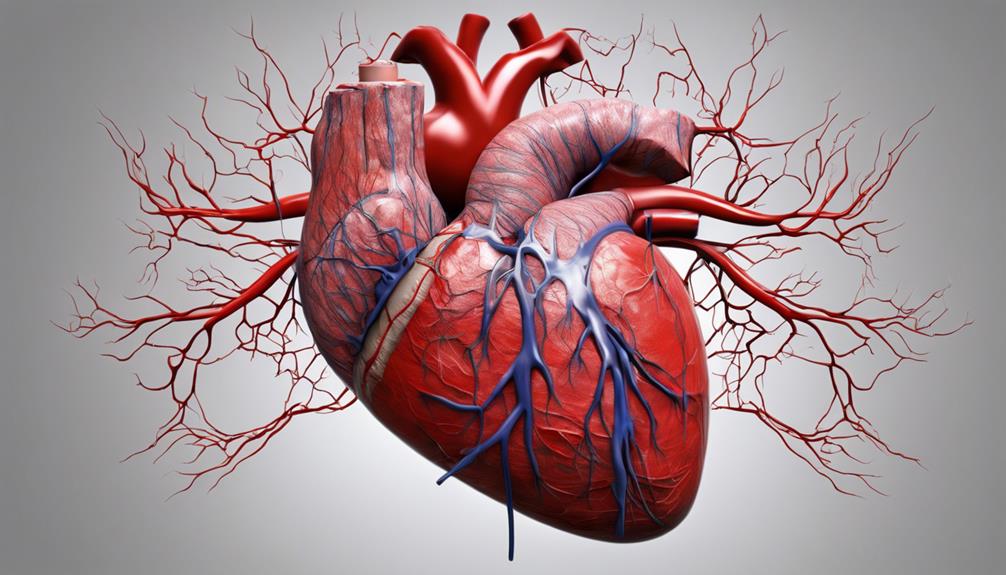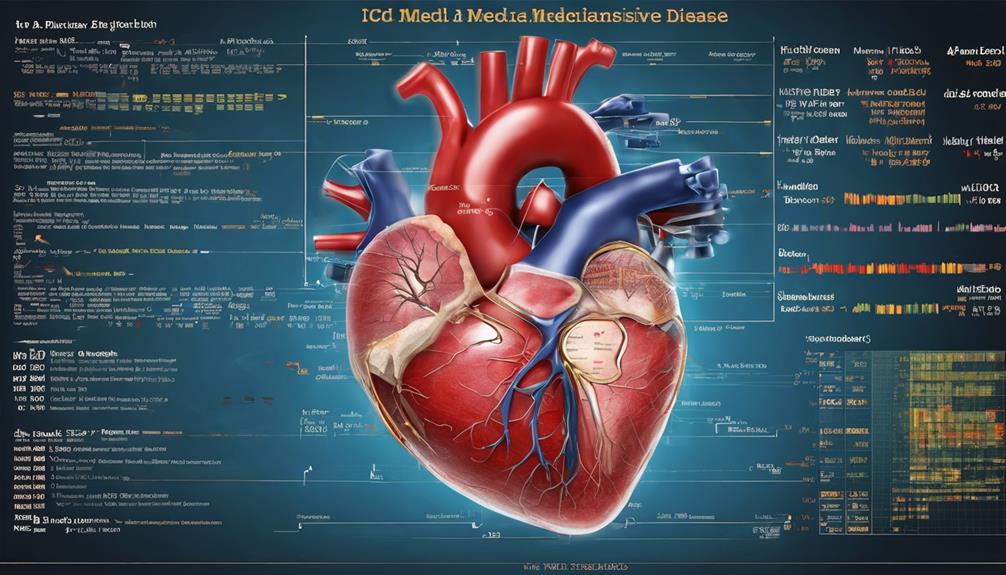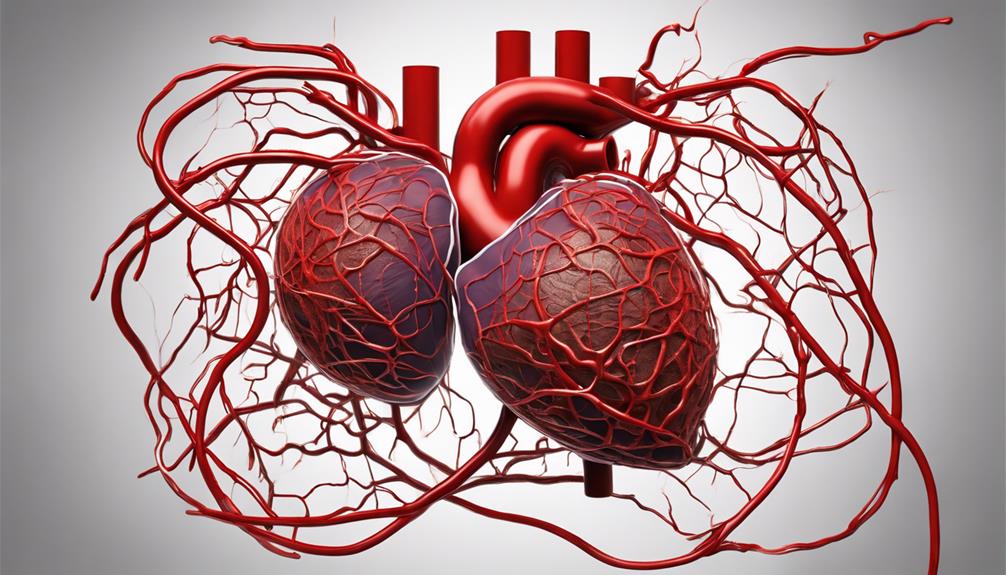Let’s delve into the complex link between hypertension, heart disease, and stroke. Upon thorough examination of these health conditions, it is clear that their correlation is not merely coincidental.
The underlying mechanisms that intertwine these cardiovascular issues raise crucial questions about their management and implications for long-term health. A deeper understanding of these relationships promises insights that could potentially reshape our approach to cardiovascular care.
Key Takeaways
- Hypertension damages arteries, leading to heart disease and stroke.
- Lifestyle changes and medication help mitigate risks of cardiovascular complications.
- High blood pressure is a major factor in stroke risk.
- Shared risk factors like obesity and smoking contribute to related conditions.
Understanding the Link Between Hypertension and Heart Disease
In the realm of cardiovascular health, the intricate connection between hypertension and heart disease underscores a critical pathway towards understanding and mitigating the risks associated with these conditions.
High blood pressure, a hallmark of hypertension, damages artery walls, triggering the accumulation of plaque that can lead to blockages within the arteries. These blockages, in turn, heighten the risk of heart disease by impeding the smooth flow of blood to the heart muscle, potentially causing heart attacks or other cardiovascular complications.
As approximately 46% of Americans grapple with hypertension, the prevalence of this condition significantly elevates the likelihood of developing heart disease. The interplay between hypertension and heart disease is a multifaceted process, wherein the damage inflicted on arteries and the narrowing of blood vessels contribute to the overall deterioration of cardiovascular health.
Therefore, gaining a comprehensive understanding of this relationship is paramount for effective prevention and management strategies aimed at safeguarding individuals from the detrimental effects of hypertension on heart health.
Impact of Hypertension on Stroke Risk

The intricate relationship between hypertension and stroke is characterized by a significant elevation in stroke risk among individuals with high blood pressure. This connection underscores the importance of managing hypertension effectively to reduce the chances of experiencing a stroke.
Consider the following key points:
- 80% Risk Increase: Statistics reveal that 80% of initial stroke incidents are linked to high blood pressure, highlighting the critical role of blood pressure management in stroke prevention.
- Artery Damage and Plaque Buildup: High blood pressure can lead to artery damage and the accumulation of plaque in blood vessels, escalating the likelihood of blockages that trigger strokes.
- Prevalence of Ischemic Strokes: Individuals with hypertension are more susceptible to ischemic strokes, wherein blood flow to the brain is obstructed, emphasizing the need for proactive hypertension control.
- Risk Mitigation Strategies: Managing hypertension through lifestyle adjustments, prescribed medications, and regular blood pressure monitoring is essential for averting hypertension-related complications, including strokes.
Shared Risk Factors Among Hypertension, Heart Disease, and Stroke
Shared risk factors among hypertension, heart disease, and stroke encompass a range of common elements, including high blood pressure, smoking, unhealthy diet, physical inactivity, and obesity. These risk factors play a crucial role in the development and progression of these interconnected conditions.
High blood pressure, in particular, is a central player in this triad, as it can lead to damage in the arteries, increasing the likelihood of heart disease like coronary artery disease and heart attacks. The relationship between hypertension, heart disease, and stroke is well-established, with individuals with hypertension being at a higher risk of developing heart disease and experiencing a stroke.
Lifestyle modifications, such as adopting a healthy diet, engaging in regular physical activity, and managing weight, can significantly reduce the risk of developing heart disease and suffering a stroke associated with high blood pressure. Understanding and addressing these shared risk factors are essential steps in preventing and managing the complex interplay between hypertension, heart disease, and stroke.
Treatment Approaches for Managing the Triad

Treatment strategies encompassing medication regimens and lifestyle modifications are pivotal in effectively managing the triad of hypertension, heart disease, and stroke. When addressing these conditions simultaneously, a comprehensive approach is essential. Here are key elements to consider:
- Blood Pressure Medications: Utilizing medications like ACE inhibitors and beta blockers can aid in controlling hypertension while also benefiting heart disease and stroke patients.
- Lifestyle Modifications: Incorporating diet changes, regular exercise, and stress management techniques play a crucial role in managing all three conditions effectively.
- Invasive Treatments: In severe cases, procedures such as angioplasty or bypass surgery may be necessary for advanced heart disease or certain types of stroke.
- Prevention Strategies: Implementing preventive measures like quitting smoking, controlling cholesterol levels, and regularly monitoring blood pressure can significantly reduce the risk of developing or exacerbating hypertension, heart disease, and stroke.
Strategies for Preventing Cardiovascular Complications
To prevent cardiovascular complications, implementing strategies such as regular physical activity, a heart-healthy diet, stress management techniques, tobacco avoidance, and cholesterol level monitoring is crucial.
Regular physical activity, like engaging in 150 minutes of moderate-intensity exercise weekly, aids in reducing the risk of cardiovascular diseases.
A heart-healthy diet, rich in fruits, vegetables, whole grains, and lean proteins, can lower the chances of developing hypertension, heart disease, and stroke.
Managing stress through techniques such as meditation, yoga, or deep breathing contributes to better cardiovascular health outcomes.
Avoiding tobacco products and secondhand smoke significantly decreases the risk of heart disease and stroke.
Monitoring and controlling cholesterol levels, particularly LDL cholesterol, is essential in preventing plaque buildup in arteries that can lead to cardiovascular complications.
Frequently Asked Questions
How Is Heart Disease Related to Stroke?
When considering how heart disease is related to stroke, it's crucial to understand that heart disease can significantly increase the risk of experiencing a stroke.
This risk is primarily due to damage to blood vessels and the promotion of clot formation. Shared risk factors such as high blood pressure and unhealthy lifestyle habits further contribute to the likelihood of a stroke occurring in individuals with heart disease.
How Are Hypertension Heart Disease and Stroke Related Abcd?
Well, when it comes to hypertension, heart disease, and stroke, the connection is crystal clear. Hypertension sets the stage for heart disease and stroke by damaging artery walls and paving the way for dangerous blockages. Left unchecked, high blood pressure can wreak havoc on the cardiovascular system, laying the groundwork for serious complications.
Managing blood pressure levels is key to safeguarding against these life-threatening conditions.
How Is Hypertension Related to Heart Disease?
When it comes to hypertension and heart disease, a strong connection exists. High blood pressure, or hypertension, damages artery walls, promoting plaque buildup that can lead to blockages in blood vessels, causing heart disease.
Statistics reveal that a significant portion of first heart attacks are linked to high blood pressure, emphasizing the importance of managing hypertension to reduce the risk of heart-related complications.
It's crucial to address hypertension to safeguard heart health.
Why Is Elevated Blood Pressure a Risk Factor in the Development of Heart Disease?
Elevated blood pressure strains the heart, causing damage to artery walls and increasing the risk of heart disease. The constant pressure on the heart can lead to hypertensive heart disease and eventual heart failure.
Additionally, high blood pressure contributes to atherosclerosis, a condition that narrows arteries and restricts blood flow to the heart. This combination of factors makes hypertension a significant risk factor in the development of heart disease.
Conclusion
In conclusion, the intricate web linking hypertension, heart disease, and stroke forms a formidable trio in the realm of cardiovascular health. Like pieces of a complex puzzle, these conditions intertwine, creating a landscape where prevention and treatment strategies must be carefully crafted.
By understanding the connections and implementing proactive measures, we can navigate the maze of risks and safeguard our hearts and brains from the storms of cardiovascular complications.









